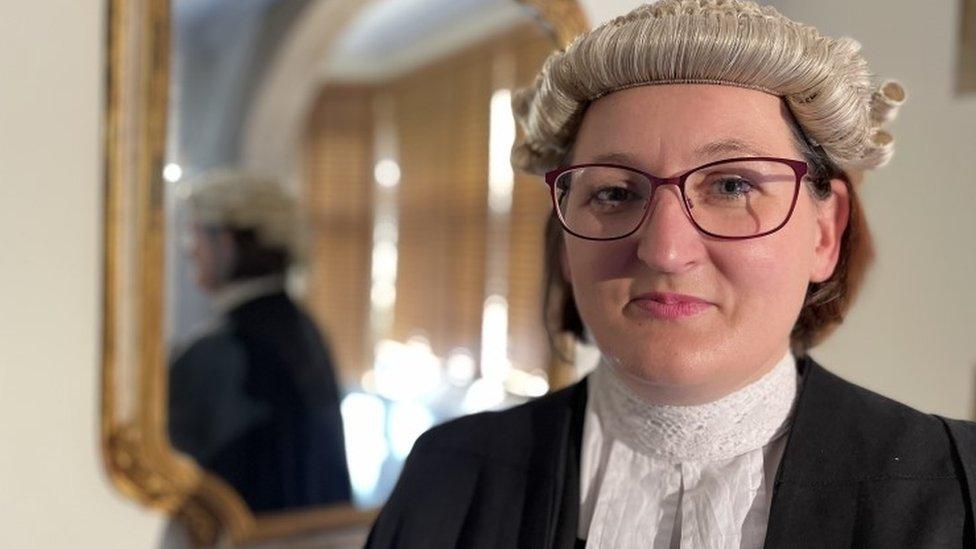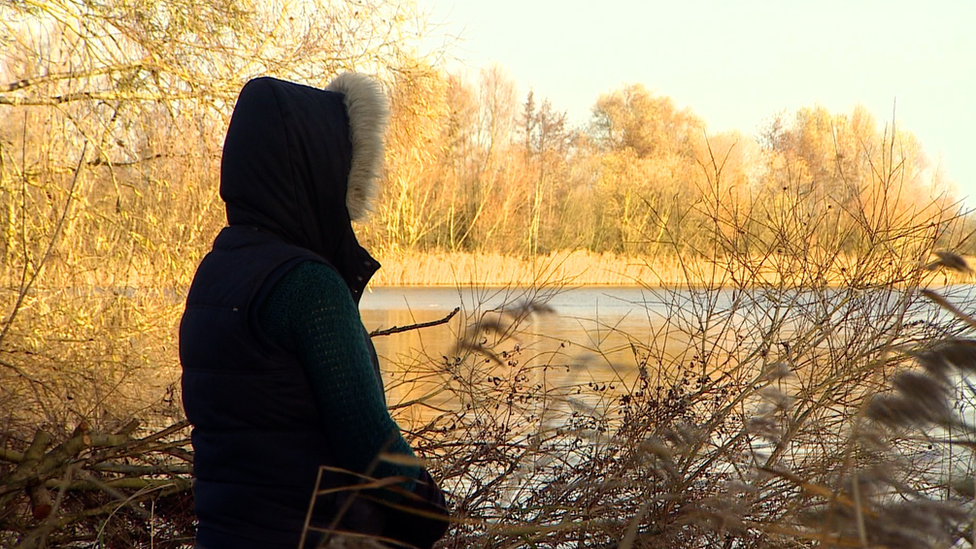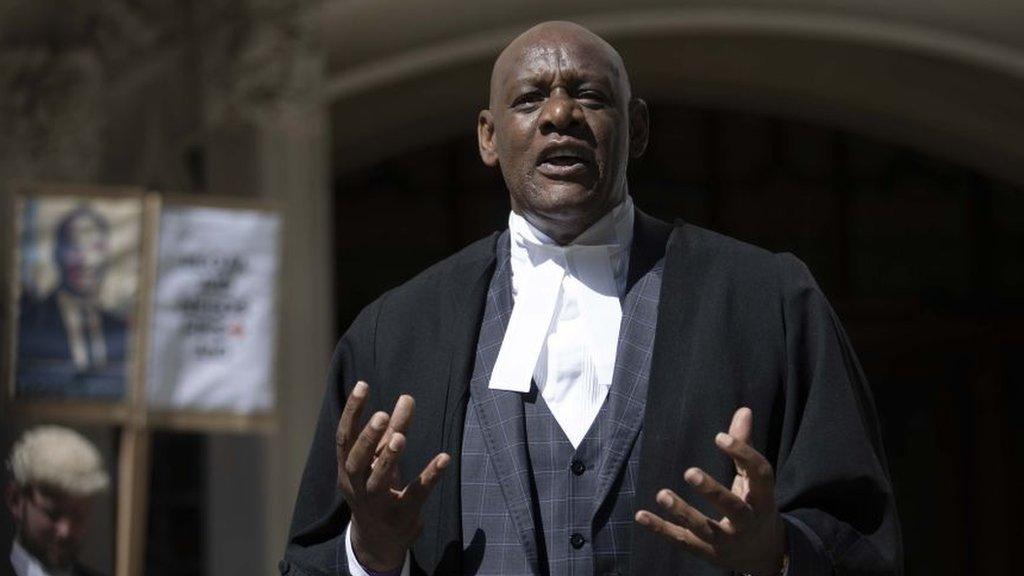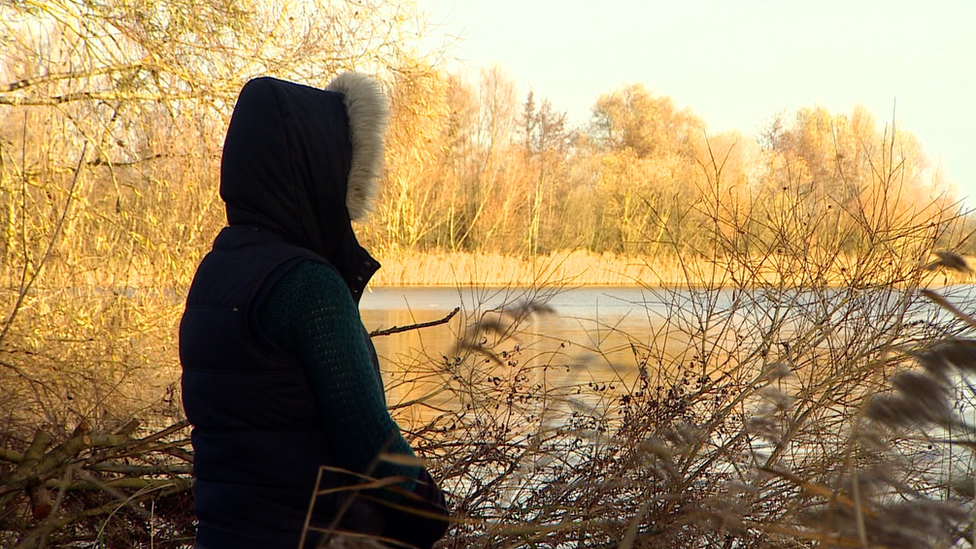Barristers strike: 'The system is falling apart and victims are let down'
- Published
As many defence barristers begin an indefinite strike over pay, the BBC spoke to a barrister about her day-to-day work in the "falling apart" criminal justice system and to an alleged victim of sexual abuse caught up in the backlog of cases.
The strike is expected to delay thousands of cases, leaving victims and the accused waiting longer for justice.

'It takes a toll on you and your life'

Diane Mundill said she had wanted to be a criminal barrister since the age of 15 and "absolutely loves" the job
Diane Mundill, of Fenners Chambers in Cambridge, is taking part in the action as a member of the Criminal Bar Association (CBA), because she believes the criminal justice system is only just " holding itself together".
She says she can work "hours and hours" overnight to prepare a case before travelling to a hearing the next morning, representing a client in court and then writing up the case.
She says barristers are paid £88 for a bail application hearing, saying this works out as minimum wage "at best", once all the extra work is factored in.
"You may not get that £88 for a number of years, if it's at the beginning of the case," she adds.
"If I sit and dwell on that I'm not going to want to do my job, and I absolutely love the job I do and we're in a position where less and less people are choosing to do it."
Ms Mundill says people are leaving the profession due to stress and the lack of remuneration for all work carried out.
"We're not dealing with nice aspects of society - it can be some very harrowing material you're having to deal with, and it takes a toll on you and your life," she says.
The backlog of cases at court, compounded in lockdown, is being exacerbated by the lack of available representation, and the strike action.
"Everyone is being let down in that system - and that's a failure of a fundamental part of our society," she says.
"Victims are the obvious people being let down, it's awful how long they have to wait to get their trial, but it's also their extended family, it's the witnesses, and the defendants and their families."
When asked about the public perception that barristers are well paid and simply wanted more, she says this is "not accurate".
"We don't get paid for our preparation, and that's not the way to treat professionals doing a professional job," she says.
"We are doing this because the criminal justice system needs support and investment; we need members to enter the criminal bar so there is a profession and a system that is sustainable, and at the moment we don't have that."

'You get your hopes up - only to be shattered'

The trial of Alex's alleged abuser has been postponed a number of times
Alex, an alleged victim of sexual abuse, spoke to the BBC in December about her long wait for justice, having had her case postponed a number of times.
Eight months on, the case is still unresolved.
"You get your hopes up and you think yeah, it's going to happen it's going to happen, only to be shattered," she says.
"Every single day I'm thinking about him.
"I'm having nightmares still.
"I'm thinking is there ever going be closure, is it ever going to go to court? Is it ever going to end?"
The case was first investigated by police in 2018. Alex was due to go to court earlier this year, but the hearing was postponed until early 2023.
"I just literally broke down in tears," she says.
"I had to have ages off work because of the stress and it was like a bereavement - again.
"I just don't know how I can keep going. It's horrendous."
Each time a court date approaches, Alex has to prepare by re-watching police interviews and reliving the crime.
"I hate to say it but I regret it, the grief it's put me through," she says.
"I've had to go on antidepressants, it's affected my health in other ways.
"It isn't worth it cos there is no justice."
'Irresponsible' strike
According to Ministry of Justice (MoJ) figures, more than 6,000 court hearings have been disrupted as a result of the dispute over conditions and government-set fees for legal aid advocacy work.
Courts in England and Wales are already dealing with a large backlog of cases, made worse by the pandemic - figures from HM Courts and Tribunal Service at the end of April showed there were 58,271 cases waiting to go to trial.
Some 6,235 court cases were disrupted during the first 19 days of industrial action between 27 June and 5 August - including 1,415 trials - according to the government.
The CBA wants a 25% rise in fees for Legal Aid cases, with the Justice Minister Sarah Dines calling the decision to strike "irresponsible".
"The escalation of strike action is wholly unjustified considering we are increasing criminal barristers' fees by 15%, which will see the typical barrister earn around £7,000 more a year," she said.
Downing Street said it was a "disappointing decision" that would "force victims to wait longer for justice".

Find BBC News: East of England on Facebook, external, Instagram, external and Twitter, external. If you have a story suggestion email eastofenglandnews@bbc.co.uk, external
Related topics
- Published22 August 2022

- Published16 December 2021
